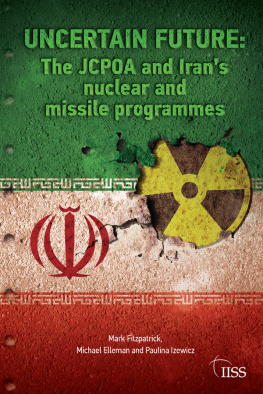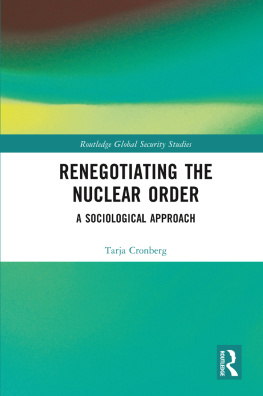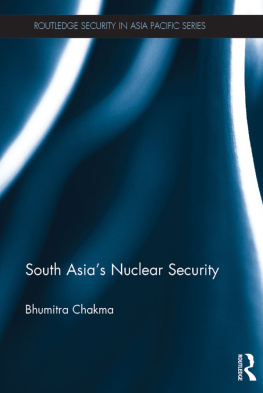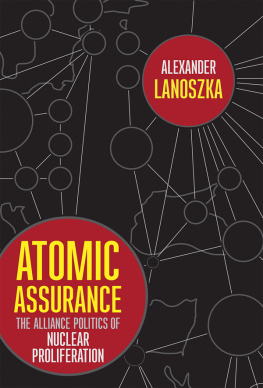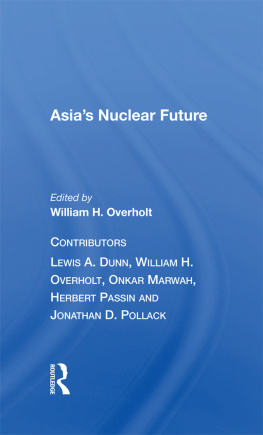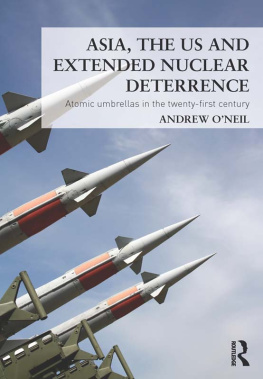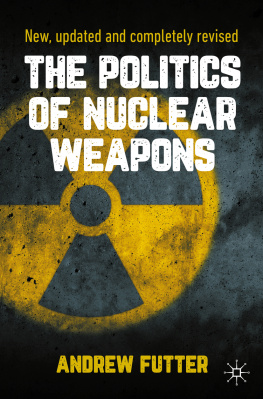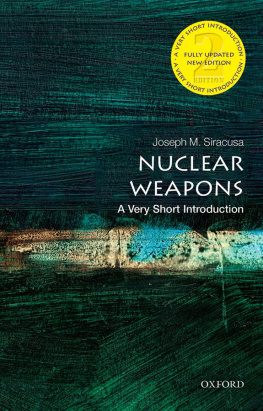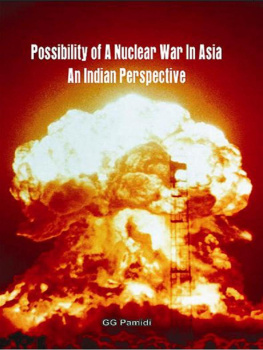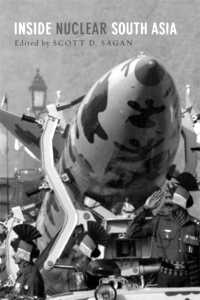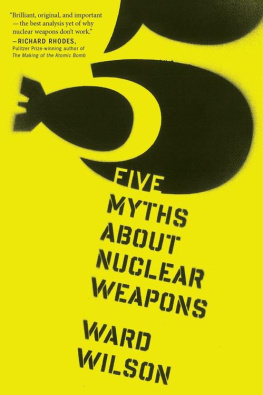Asias Latent Nuclear Powers:
Japan, South Korea and Taiwan
Mark Fitzpatrick
Asia's Latent Nuclear Powers: Japan, South Korea and Taiwan
Mark Fitzpatrick
The International Institute for Strategic Studies
Arundel House | 13-15 Arundel Street | Temple Place | London | WC2R 3DX | UK
First published 2016 by Routledge
2 Park Square, Milton Park, Abingdon, Oxon OX14 4RN
711 Third Avenue, New York, NY 10017, USA
Routledge is an imprint of the Taylor & Francis Group, an informa business
First issued in hardback 2017
Copyright 2016 The International Institute for Strategic Studies
DIRECTOR-GENERAL AND CHIEF EXECUTIVE Dr John Chipman
EDITOR Dr Nicholas Redman
EDITORIAL MANAGER Nancy Turner
EDITORIAL Anna Ashton, Bonnie Bley, Jill Lally, Chris Raggett
COVER/PRODUCTION John Buck, Kelly Verity
The International Institute for Strategic Studies is an independent centre for research, information and debate on the problems of conflict, however caused, that have, or potentially have, an important military content. The Council and Staff of the Institute are international and its membership is drawn from almost 100 countries. The Institute is independent and it alone decides what activities to conduct. It owes no allegiance to any government, any group of governments or any political or other organisation. The IISS Stresses rigorous research with a forward-looking policy orientation and places particular emphasis on bringing new perspectives to the strategic debate.
The Institute's publications are designed to meet the needs of a wider audience than its own membership and are available on subscription, by mail order and in good bookshops. Further details at www.iiss.org.
All rights reserved. No part of this book may be reprinted or reproduced or utilised in any form or by any electronic, mechanical, or other means, now known or hereafter invented, including photocopying and recording, or in any information storage or retrieval system, without permission in writing from the publishers.
Notice:
Product or corporate names may be trademarks or registered trademarks, and are used only for identification and explanation without intent to infringe.
British Library Cataloguing in Publication Data
A catalogue record for this book is available from the British Library
Library of Congress Cataloging in Publication Data
ADELPHI series
ISSN 1944-5571
ADELPHI 455
ISBN 978-1-138-93080-3 (pbk)
ISBN 978-1-138-45240-4 (hbk)
The author is indebted to Fred McGoldrick, David Santoro, Joshua Pollack, Alan Romberg, James Acton, Takaaki Daitoku, William Choong, Dr Paul Irwin Crookes and Nobuyasu Abe for their helpful suggestions in reviewing portions of this book. They and many others also gave freely of their time in often lengthy interviews. Interviewees included Haruyuki Aikawa, Dr Nobumasa Akiyama, David Albright, Ambassador Cho Chang-beom, Ambassador Chun Yungwoo, Toby Dalton, Robert Einhorn, Ambassador Tetsuya Endo, Dr Shu Yuan Hsieh, Dr Yoichi Funabashi, Dr Katsuhisa Furukawa, Dr Michael Green, Dr Hahm Chaibong, Takuya Hattori, Corey Hinderstein, Dr Hong Kyudok, Dr Richard Juichou Hu, Dr Jo Dong-joon, Dr Jun Bong-geun, Dr Kim Changsu, Dr Kim Jiyoon, Dr Kim Taewoo, Dr Lee Sang Hyun, Dr Liu Fu-kuo, Yosuke Naoi, Masakatsu Ota, Dr Douglas Paal, Dr James Przystup, Dr Ely Ratner, Ambassador Yukio Satoh, Dr James Schoff, Leonard (Sandy) Spector, Dr Tatsujiro Suzuki, Sugio Takahashi, Dr Wang Yu-lung, Dr Tsuneo Watanabe, Chris Wood, Dr Andrew Yang, David Yao, Dr Yim Man-sung, Youn Jong Kwon and anonymous officials in four capitals. Alireza Shams Lahijani provided research assistance.
The Japan Institute for International Affairs, the Japanese National Institute for Defense Studies and the Center for Security Studies at National Chengchi University held round-table discussions on my behalf that brought insights and clarity to the issues, as did a conference hosted by the Nuclear Nonproliferation Education and Research Center at the Korea Atomic Energy Research Institute. Taiwans Institute of Nuclear Energy Research provided a detailed briefing, as did several other institutes and government bodies in Taiwan during a tour by UK-based academics organised by the Taiwan Ministry of Foreign Affairs that the author had the good fortune to lead.
Finally, the author appreciates the unconditional support he received from his wife, Kyoko, while working on the manuscript. This book is dedicated to their sons, Thomas and Robert, whose births in Seoul and Tokyo respectively underscore the authors personal attachment to the region.
- A2AD anti-access/area-denial
- AIT American Institute in Taiwan
- AEC Atomic Energy Council (Taiwan)
- AVLIS atomic vapour laser isotope separation (an enrichment method)
- CIA Central Intelligence Agency
- CEP circular error probable
- CSIST Chung-Shan Institute of Science and Technology (Taiwan)
- CTBT Comprehensive Nuclear-Test-Ban Treaty
- DPJ Democratic Party of Japan
- DPP Democratic Progressive Party (Taiwan)
- DPRK Democratic Peoples Republic of Korea
- EDD Extended Deterrence Dialogue (JapanUS)
- Euratom European Atomic Energy Community
- FBR fast-breeder reactor
- FCA Fast Critical Assembly
- HEU highly enriched uranium
- IAEA International Atomic Energy Agency
- ICBM intercontinental ballistic missile
- INER Institute for Nuclear Energy Research (Taiwan)
- JDA Japan Defense Agency
- JSDF Japan Self-Defense Forces
- KAERI Korea Atomic Energy Research Institute
- KMT Kuomintang (Taiwan)
- LDP Liberal Democratic Party (Japan)
- LEU low-enriched uranium
- MOX mixed-oxide
- MWt Megawatt thermal
- NPP nuclear power plant
- NPR Nuclear Posture Review (US)
- NPT Non-Proliferation Treaty
- NTD New Taiwan Dollar
- PRC Peoples Republic of China
- PSI Proliferation Security Initiative
- ROC Republic of China
- ROK Republic of Korea
- SLV space-launch vehicle
- SWU separative work unit
- THAAD Terminal High Altitude Area Defense
- TLAM-N Tomahawk Land Attack Missile (nuclear-armed)
- TRA Taiwan Relations Act
The three Northeast Asian democracies that are the focus of this book are not suspected of nuclear proliferation. Japan, the Republic of Korea (ROK, or South Korea) and Taiwan (the Republic of China) have accepted all relevant global non-proliferation instruments and are in good standing with their obligations. They promote non-proliferation abroad, and their open, free societies would not sustain secret nuclear programmes at home. Yet each of the three makes for an interesting case study on potential proliferation. Ample grounds for analysis are provided by their advanced industries for nuclear and other dual-use technologies, their past pursuit of nuclear weapons and their desire to avert threats posed by nuclear-armed adversaries.
Global attention to the danger of nuclear proliferation is generally focused on the states that lie outside the Nuclear Non-Proliferation Treaty (NPT) or that have violated key requirements of the treaty. North Korea, Iran, Pakistan, Syria and, until recently, Iraq, Libya and Myanmar have been the usual suspects. India and Israel are also among the outliers. One reason for concern is that nuclear proliferation often has a knock-on effect. Acquisition of the atomic bomb by the United States, which had pooled knowledge with the United Kingdom, spurred the Soviet Union to keep pace. The Soviets then shared A-bomb technology with China, which led India to seek a nuclear equaliser. With help from China, Pakistan matched India. Due to these and other cases, the domino theory became a staple of the nuclear-proliferation literature.


